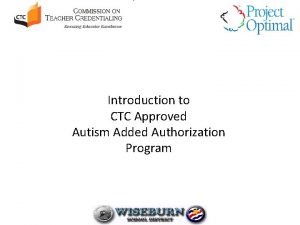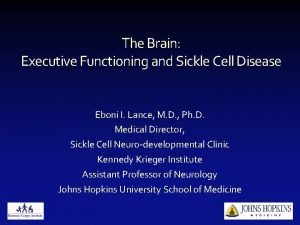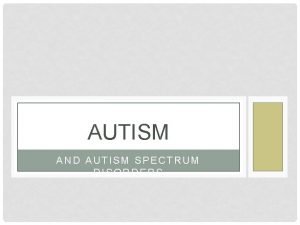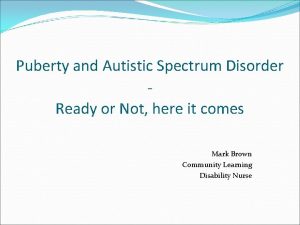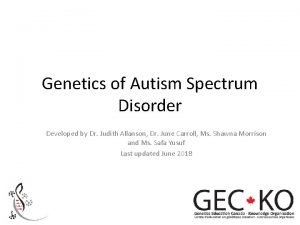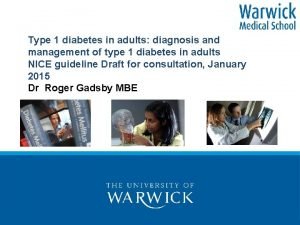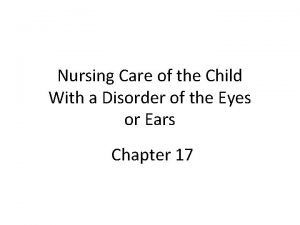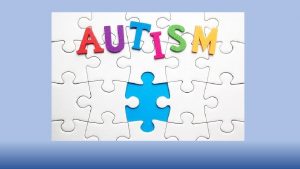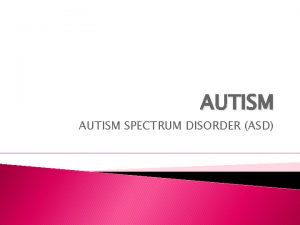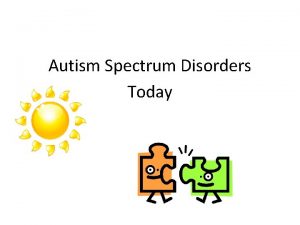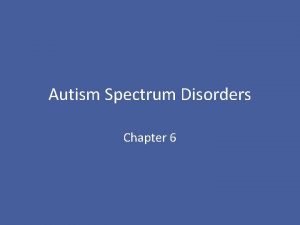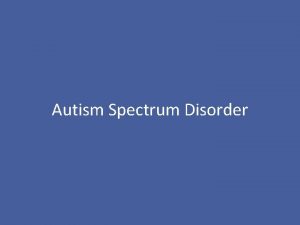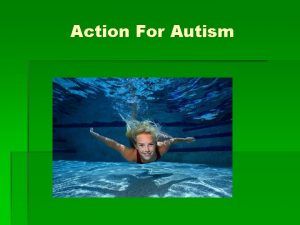Firsttime Diagnosis of Adults on the Autism Spectrum









- Slides: 9

First-time Diagnosis of Adults on the Autism Spectrum Janet Miller, Ph. D, JD Clinical Psychologist Department of Psychiatry and Behavioral Sciences Stanford University, School of Medicine 1

Adults Seeking First-time Diagnosis of Autism Spectrum Disorder (ASD) q Trend of adults seeking first-time ASD diagnosis q Tend to be verbally-fluent, with average or aboveaverage cognitive abilities q Possible reasons for not being diagnosed in childhood: - “Flew under the radar” Inaccurate diagnosis Unconscious bias Lack of awareness

Why now? ? ? q Access to appropriate treatment and services › Effective treatment and autism-specific supports › Accommodations and governmental services q May help answer questions about their life and experiences › Sense of relief and perspective › Awareness of strengths and challenges › Increased sense of belonging and decreased loneliness q May improve relationships (increased empathy, understanding and support)

AUTISTIC SPECTRUM DISORDER DSM-5 Hyperactivity/ Impulsivity Inattention Anxiety Depression Two Core Domains Lack of socialemotional reciprocity Sensory aberrations Deficits in nonverbal communication Stereotyped or repetitive behaviors Difficulty developing & maintaining relationships Insistence on sameness; rituals Obsessions and/or compulsions Sleep & eating problems 4 Language development delay Adapted from slide by Lawrence Fung, MD Irritability & emotional dysregulation Aggression towards others Self-injurious behaviors Executive functioning deficits Restricted interests Deficits in independent living skills Intellectual disabilities Lack of central coherence

DSM-5 Criteria for ASD (cont. ) q Past: At least some symptoms must have been present in early childhood q Present: Must have significant impairment in important areas of current functioning q Very heterogeneous! - Different etiologies and treatments - Individual presentations vary widely - Important to assess for co-occurring conditions

Elements of ASD Assessment with Verbal Adults q Parent/caregiver clinical interview based on DSM-5 - Current behavior and level of impairment - Detailed development history q Adult diagnostic assessment - Clinical interview and observation of social, communication and repetitive behaviors (e. g. , ADOS-2) - Cognitive testing - Self-report questionnaires q R/O medical conditions, if suspected (e. g. , seizures, genetic abnormalities, etc. )

Co-occurring Mental Health Conditions in ASD q Prevalence is significantly higher in adults with ASD q Having co-occurring psychiatric conditions is associated with poorer long-term outcomes q Most common in adults with ASD: • • Anxiety disorders Depressive disorders ADHD Obsessive-compulsive disorder (OCD)

Challenges in Diagnosing Adults with ASD q Autism symptoms of adults with first-time ASD diagnosis tend to be more subtle q Complicated by co-occurring mental health conditions • Can mask or mimic ASD symptoms (e. g. , bipolar disorder, depression, ADHD, psychosis, eating disorders, etc. ) • Differential diagnosis vs. co-occurring conditions q Lack of reliable, detailed early developmental history q Barriers to access q Assessment tools and diagnostic criteria

THANK YOU!!!
 Ctc added authorization
Ctc added authorization Autism spectrum disorder adhd
Autism spectrum disorder adhd Asd levels
Asd levels Types of autism spectrum disorder
Types of autism spectrum disorder Puberty and autism spectrum disorders
Puberty and autism spectrum disorders Autism spectrum disorder
Autism spectrum disorder Type 1 diabetes in adults diagnosis and management
Type 1 diabetes in adults diagnosis and management Nursing care plan for conjunctivitis slideshare
Nursing care plan for conjunctivitis slideshare The nursing process
The nursing process Chromium and copper electron configuration
Chromium and copper electron configuration
